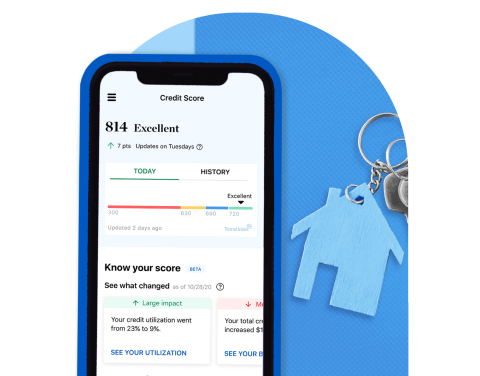
Most borrowers have scores in the high 600s to 700s. Lenders set their own minimum requirements by loan type.

Bev O'Shea
personal finance writer | MSN Money, Credit.com, Atlanta Journal-Constitution, Orlando Sentinel
Bev O'Shea is a former NerdWallet authority on consumer credit, scams and identity theft. She holds a bachelor's degree in journalism from Auburn University and a master's in education from Georgia State University. Before coming to NerdWallet, she worked for daily newspapers, MSN Money and Credit.com. Her work has appeared in The New York Times, The Washington Post, the Los Angeles Times, MarketWatch, USA Today, MSN Money and elsewhere. Twitter: @BeverlyOShea.
Reviewed by Michelle Blackford Michelle Blackford
Michelle Blackford spent 30 years working in the mortgage and banking industries, starting her career as a part-time bank teller and working her way up to becoming a mortgage loan processor and underwriter. She has worked with conventional and government-backed mortgages. Michelle currently works in quality assurance for Innovation Refunds, a company that provides tax assistance to small businesses.
At NerdWallet, our content goes through a rigorous editorial review process. We have such confidence in our accurate and useful content that we let outside experts inspect our work.
Assistant assigning editor at large Dawnielle Robinson-Walker
Assistant assigning editor at large | McGraw Hill, Hallmark Cards, Forbes Health
Dawnielle Robinson-Walker spent 16 years as a college English instructor, teaching creative writing and African-American literature before she began writing and editing for various companies and online publications. Prior to joining NerdWallet, she was an editor at Hallmark Cards and a contributing writer at Forbes Health.
Fact Checked Co-written by Kate Wood Lead Writer/Spokesperson Kate Wood
Lead Writer/Spokesperson | Homebuying, mortgages, student loans
Kate Wood is a mortgages and student loans writer and spokesperson who joined NerdWallet in 2019. With an educational background in sociology, Kate feels strongly about issues like inequality in homeownership and higher education, and relishes any opportunity to demystify government programs. Prior to joining NerdWallet, she wrote about home remodeling, decor and maintenance for This Old House magazine.
Some or all of the mortgage lenders featured on our site are advertising partners of NerdWallet, but this does not influence our evaluations, lender star ratings or the order in which lenders are listed on the page. Our opinions are our own. Here is a list of our partners.
Table of Contents
Nerdy takeawaysTable of Contents
Nerdy takeawaysOften, a mortgage is the biggest loan you’ll take out in your lifetime, so it makes sense that lenders require a minimum credit score for mortgages. A good score suggests to lenders that you can make your payments on time.
If you have below average credit, you still have options when it comes to a mortgage. But if you have a higher credit score, you'll generally qualify for more loan options and lower interest rates.
Credit score requirements differ by lender and loan type. For example, conventional loans typically require a higher credit score than government-backed loans insured by the Federal Housing Administration.
Whether your credit is flawless or average, here’s what to expect when you apply for a mortgage.
Switching your insurance could save you hundreds a year
Link your auto or property policy to our insurance assistant and we’ll tell you if you could save money. We’ll even do the shopping for you.
Learn more
For most loan types, the credit score needed to buy a house is at least 620. However, a higher score significantly improves your chances of approval.
Applicants with scores of 740 or higher generally get the lowest interest rates. Mortgage lenders use a FICO score to determine your creditworthiness.
If your credit score is on the low side, it may make sense to work on building it up before buying. For personalized advice, find a housing counselor through the U.S. Department of Housing and Urban Development (HUD) . These services are available at low or no cost.
Though you may be able to get a conventional loan with a credit score as low as 620, these mortgages often require higher scores. And again, a higher credit score can help you get a lower interest rate. Borrowers with higher scores also earn a break in the cost of private mortgage insurance , or PMI, which is required if you make a down payment of less than 20% on a conventional loan.
With a 10% down payment, a 620 borrower will pay 1.1% in PMI, according to Joe Parsons, a branch manager and senior loan officer at Pinnacle Home Loans in Dublin, California. A 760 FICO borrower would pay just 0.30%, he says.
If you have a credit score in the 500s, your best chance for a home loan will be one insured by the Federal Housing Administration. That said, lenders can impose their own credit minimums for FHA loans, and borrowers who just meet these minimums will likely have a harder time getting approved.
FHA loans allow down payments as low as 3.5%. However, to qualify for a low-down-payment FHA loan, you’ll need a FICO score of 580 or better. With a credit rating of 500 to 579, you'll be required to make a 10% down payment.
If a borrower has a credit score below 600, a lender would likely lend to them only if other aspects of their financial situation were secure.
“Someone with a 500 credit score is likely to have some combination of collection accounts, liens and judgments,” Parsons says. “Even though FHA will insure a loan with a 500 score, the lender will require that collections, judgments and most liens be paid off before closing.”
Switching your insurance could save you hundreds a year
Link your auto or property policy to our insurance assistant and we’ll tell you if you could save money. We’ll even do the shopping for you.
Learn more
Mortgages guaranteed by the Department of Veterans Affairs, better known as VA loans , don't have a government-set minimum credit score to buy a house. Their main qualification is that you be a veteran, an active-duty member of the military or an eligible spouse.
That said, VA lenders choose their own minimum credit scores. These vary, but they are generally in the low to mid-600s.
Like VA loans, home loans from the U.S. Department of Agriculture don't have a set minimum credit score, and lenders can require their own score minimums. But if your score is over 640, you could be eligible for streamlined credit processing on a USDA loan .
To get a mortgage that's larger than the conforming loan limit — better known as a jumbo loan — most lenders will want to see a credit score around 700 or higher, and sometimes as high as 760. Because lending that much money is inherently risky, lenders look for potential home buyers to have solid financials, including a strong credit score.
With a FICO score of 740 or higher, you’re likely to get the best jumbo mortgage rates . Using a mortgage calculator can make clear how even a slightly lower rate can make a big difference.
Your credit score isn’t the only thing lenders look at when determining if you qualify for a mortgage.
Other key factors include:
Debt-to-income ratio, or DTI: This calculation, written as a percentage, lets lenders know if you can handle taking on additional debt. DTI compares all of your monthly loan payments (debt) to the pretax, or gross, amount you earn every month (income). The lower, the better: Ideally, your DTI should be below 36% to qualify for the best mortgage options.
Loan-to-value ratio, or LTV: This measures how much money you’ll owe on the loan compared to what the house is worth. A lower LTV makes you less risky to lenders. To bring down the LTV, make a larger down payment.
Income and employment history: Most lenders will verify your employment and see if you’ve been earning a steady income for the past two years. These are key indicators that you’ll be able to repay your loan. However, if you’re retired or not actively working, your lender will ask for other forms of proof that you can make your monthly mortgage payments.
Savings and assets: Lenders also look at your overall net worth, such as your cash savings, retirement accounts, investments and other assets. This helps determine how long you could continue to make payments if you lost your main source of income.
Having bad credit, or no credit , may mean you’re unlikely to get a mortgage unless someone you know is willing to help out. Having a co-signer who has a better credit score could help you secure the loan.
If such assistance isn’t available to you, your best bet will be waiting and working on your credit.
Switching your insurance could save you hundreds a year
Link your auto or property policy to our insurance assistant and we’ll tell you if you could save money. We’ll even do the shopping for you.
Learn more
If your score doesn’t qualify for a great rate or the type of mortgage you'd prefer, it might make sense to put off homebuying for a while and use the time to build your credit profile.
Pay all bills on time: Payment history is the biggest of all the factors that affect your credit score .
Maintain low credit card balances: Experts recommend you use no more than 30% of the limit on any credit card, and much lower is much better. How much of your available credit you are using is called your credit utilization , and it’s the second-biggest factor in your score.
Check your credit reports: Look for score-lowering errors. If you find something, dispute it. You are entitled to at least one free credit report from each of the three major credit bureaus — Experian, Equifax and TransUnion — every week.
Keep credit cards open: Closing a card reduces the amount of available credit you have, which can send your credit utilization up and ding your score. Make a charge occasionally and pay it off promptly; that keeps the issuer from closing your account for inactivity.
Apply for new credit sparingly. If you’re trying to build up a thin credit file, you could add a new credit card, a secured credit card or a credit-builder loan. However, note that you want six or more months to elapse between opening a new account and applying for a mortgage, so time applications wisely.
The smart home for your credit NerdWallet tracks your credit score and shows you ways to build it — for free. GET THE SCOOP
While you're working toward the credit score needed to buy a house, check your progress with a free score; some credit cards and many personal finance websites offer them. (NerdWallet offers a free credit score that updates weekly.)
Free credit score services usually use VantageScore , a credit scoring model that's a competitor to FICO. Mortgage lenders tend to use older versions of the FICO model (FICO 2, 4 or 5), but you can track your progress using either type of score. Though your VantageScore and your FICO score may not be identical, they generally move in the same direction.
Did you know.Mortgage lenders are starting to update their credit scoring models. In October 2022, the Federal Housing Finance Agency approved the use of FICO 10T and VantageScore 4.0 for evaluating borrowers. These newer models incorporate more data, like rent and utility payments, and offer a more holistic view of borrowers' credit. While the FHFA expects the transition to take several years, these more inclusive credit models could open up homeownership to a larger group of borrowers.
If you want to check your actual FICO score so you know exactly what mortgage lenders will see, you’ll have to purchase a comprehensive FICO report. You can do that at myFICO.com .
Be sure to cancel before the next billing cycle starts; the monthly subscription fee will not be prorated.
However, if you’re near or in the excellent credit score range (generally 720 and above on the common 300-850 scale) on a free score source, you don’t need to pay to check your FICO scores. You almost certainly have good enough credit to qualify for a solid mortgage rate.
Switching your insurance could save you hundreds a year
Link your auto or property policy to our insurance assistant and we’ll tell you if you could save money. We’ll even do the shopping for you.
Learn more
You’re following Bev O'Shea
Visit your My NerdWallet Settings page to see all the writers you're following.
Bev O'Shea is a freelance writer and a former NerdWallet staff member who specializes in consumer credit, scams and identity theft. Her work has appeared in The New York Times, The Washington Post, MarketWatch and elsewhere. See full bio.
You’re following Kate Wood
Visit your My NerdWallet Settings page to see all the writers you're following.
Kate Wood is a mortgages and student loans writer and spokesperson who joined NerdWallet in 2019. With an educational background in sociology, Kate feels strongly about inequality in homeownership and higher education. See full bio.
On a similar note.

Download the app

Disclaimer: NerdWallet strives to keep its information accurate and up to date. This information may be different than what you see when you visit a financial institution, service provider or specific product's site. All financial products, shopping products and services are presented without warranty. When evaluating offers, please review the financial institution's Terms and Conditions. Pre-qualified offers are not binding. If you find discrepancies with your credit score or information from your credit report, please contact TransUnion® directly.
NerdUp by NerdWallet credit card: NerdWallet is not a bank. Bank services provided by Evolve Bank & Trust, member FDIC. The NerdUp by NerdWallet Credit Card is issued by Evolve Bank & Trust pursuant to a license from MasterCard International Inc.
Impact on your credit may vary, as credit scores are independently determined by credit bureaus based on a number of factors including the financial decisions you make with other financial services organizations.
NerdWallet Compare, Inc. NMLS ID# 1617539
California: California Finance Lender loans arranged pursuant to Department of Financial Protection and Innovation Finance Lenders License #60DBO-74812
Insurance Services offered through NerdWallet Insurance Services, Inc. (CA resident license no.OK92033) Insurance Licenses
NerdWallet™ | 55 Hawthorne St. - 10th Floor, San Francisco, CA 94105